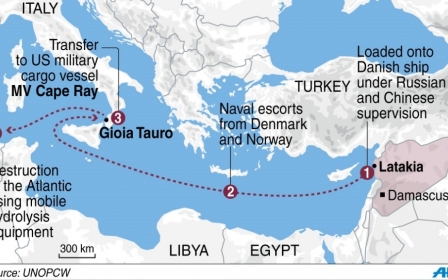Syria witnessed 'systematic' chemical weapons use

Chemical weapons such as chlorine have likely been used in a "systematic manner" in Syria, according to a report by a team from the world's watchdog investigating alleged attacks there.
The Organisation for the Prohibition of Chemical Weapons (OPCW) mission said evidence "lends credence to the view that toxic chemicals, most likely pulmonary irritating agents such as chlorine, have been used in a systematic manner in a number of attacks," according to a copy of the report obtained by AFP.
President Bashar al-Assad's government and rebels have both accused the other of using chemical agents, including chlorine, in the bloody uprising that began in March 2011 and in spite of Damascus promising to hand over all its chemical arms.
The OPCW team probing the allegations was attacked with a roadside bomb and gunfire on May 27, preventing them accessing the site of an alleged attack in the village of Kafr Zeyta.
"The attack on the team and the resulting denial of access prevents it from presenting definitive conclusions," the report added.
Nevertheless, the allegations "cannot be dismissed as unconnected, random, or of a nature attributable to purely political motives," the report said.
Despite not being able to visit the alleged site of the chlorine attack, OPCW officials spoke to doctors in Kafr Zeyta "and obtained their verbal medical reports relating to the treatment of individuals allegedly affected by exposure to chlorine."
The team also saw video footage of the alleged attack and of alleged munitions used in the attack, some of which remained intact.
The report noted that chlorine is a widely available chemical, that is non-persistent and so conclusively proving its use is "a challenging task".
Syria did not have to declare its stockpile of chlorine -- a weak toxic agent that can be considered a chemical weapon if used offensively -- as part of the disarmament deal as it is widely used for commercial and domestic purposes.
The report from the watchdog's Technical Secretariat noted that a ceasefire had been agreed between the regime and rebels on the day of the May 27 visit.
Syria air raid kills nine children in displaced camp
Meanwhile, Syrian army helicopter fire killed nine children in a camp for displaced civilians near the Jordanian border on Wednesday, a monitoring group said.
They were among 12 civilians killed in the air raid on the camp near the village of Shajara, south of Damascus, the Syrian Observatory for Human Rights said.
The youngest of those killed was a girl aged just four, the Britain-based group said, adding that seven people were also wounded, three of them women.
"The victims were all civilians, people who had fled the violence in other parts of Daraa province," Observatory director Rami Abdel Rahman told AFP.
The air raid comes amid escalating violence in Daraa province, where rebels have been advancing in recent months, according to activists.
Nearly half of Syria's population has fled their homes since the uprising against Assad's rule erupted in March 2011.
More than three million have found refuge abroad.
But around six million more are displaced inside Syria, with many living in terrible conditions in camps along the borders.
On Tuesday night, Syrian government aircraft also bombarded several rebel-held areas of Aleppo province in the north, keeping up an aerial offensive that has killed some 2,000 people, including more than 500 children, since January, according to the Observatory.
The army fired two surface-to-surface missiles at the Waar district of Homs, the only area of the central city still under opposition control, activists reported.
Barrel bombs, which are filled with high-explosives, oil and shrapnel, are often dropped from Syrian army helicopters. Vacuum bombs, which explode above ground creating a huge blast wave, are usually used in confined spaces such as urban areas.
The Syrian government's official news agency SANA claimed security forces "neutralized" a large number of armed groups during operations in Idlib, Latakia, Aleppo and Homs.
Stay informed with MEE's newsletters
Sign up to get the latest alerts, insights and analysis, starting with Turkey Unpacked
Middle East Eye delivers independent and unrivalled coverage and analysis of the Middle East, North Africa and beyond. To learn more about republishing this content and the associated fees, please fill out this form. More about MEE can be found here.




